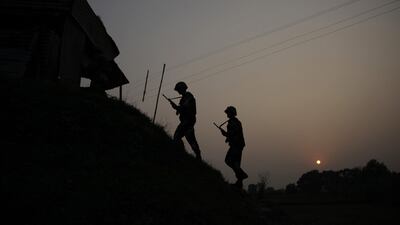NEW DELHI // The United Nations secretary general Ban Ki-moon urged restraint in Kashmir on Saturday as Indian and Pakistani troops exchanged fire across their border.
Mr Ban called on both sides to “take immediate steps to de-escalate the situation”, and urged them to address their differences through diplomacy.
Two days after Indian troops carried out what they called “surgical strikes” across the Pakistani side of the line that divides the disputed territory, there were cross-border skirmishes further south.
Although there were no casualties, the predawn exchanges heightened the fear among villagers living along the border, tens of thousands of whom have already been ordered to leave home.
“There was small-arms fire and mortar shells fire from across the border in Akhnoor sector which lasted for around two hours,” said Pawan Kotwal, a senior civilian official in the Indian state of Jammu and Kashmir.
The Pakistani military said its troops had “befittingly responded to Indian unprovoked firing” in the Bhimber sector on the Pakistani side.
The exchanges came shortly before Indian army chief Dalbir Singh travelled to Northern Command headquarters, which are in Jammu and Kashmir, to meet soldiers involved in Thursday’s operation.
Mr Singh was able to “personally compliment officers and men who successfully executed surgical strikes” , the Indian army said.
The two countries have fought three full-blown wars in the past seven decades, including two over Kashmir. The latest stand-off has been gathering momentum for three months.
It began in early July, when a charismatic Kashmiri separatist was shot dead by Indian soldiers. Since then, more than 80 civilians have been killed in the region, many of whom had joined street protests in defiance of a curfew order.
A militant group based in Pakistan then carried out a raid on an Indian army base in mid-September which killed 19 soldiers, the highest number of deaths in a cross-border attack in more than a decade.
Amid public anger over the raid, India has sought to isolate Pakistan – which it accuses of sponsoring extremist groups – and has persuaded nearly all of its neighbours to boycott a regional summit next month in the Pakistani capital, Islamabad.
India’s announcement that it had carried out “surgical strikes” in the early hours of Thursday on militant posts on the Pakistani side of the Kashmiri frontier in turn provoked fury in Islamabad, where the prime minister, Nawaz Sharif, denounced what he called “naked aggression”.
Pakistan’s ambassador to the UN, Maleeha Lodhi, met Mr Ban at UN headquarters in New York overnight to ask the veteran diplomat to intervene personally.
“His good offices are available, if accepted by both sides,” said his spokesman.
Ms Lodhi said the time had come for “bold intervention” by Mr Ban while India’s representative at the UN agreed there was “no desire to aggravate the situation”.
But aware that matters could yet escalate, India has evacuated thousands of people from near the northern border in Punjab state as well as in Jammu.
The situation in the Punjab village of Naushera Dhalla appears to be typical: most of the 4,500-strong population has gone, leaving only a small number of men to guard their land.
The village was also evacuated in 1971, the last time the two countries fought an all-out war.
“We take turns to patrol the main road to make sure no thieves or robbers come into the village,” said Jamshed Singh, one of those remaining.
“I haven’t had a drop of alcohol for the last four nights because if there is an emergency and any of us are drunk, we may not be able to react as fast as we need.”
Meanwhile in the Battal sector of Pakistani-controlled Kashmir, normal life has also come to a halt. Shopkeeper Shujaat Kazi said: “Our market is closed as no one dares to venture outside.”
And in Wagha in Pakistan, a daily flag-lowering ceremony at an Indian-Pakistani border crossing has become a show of strength and patriotism.
Thousands of Pakistanis thronged the border town yesteday to watch their soldiers lower the flag. The ceremony takes place every evening before sunset and features the perfectly coordinated simultaneous lowering of both flags and formal handshakes between Indian and Pakistani soldiers. Very few people attended from the Indian side.
* Agence France-Presse

